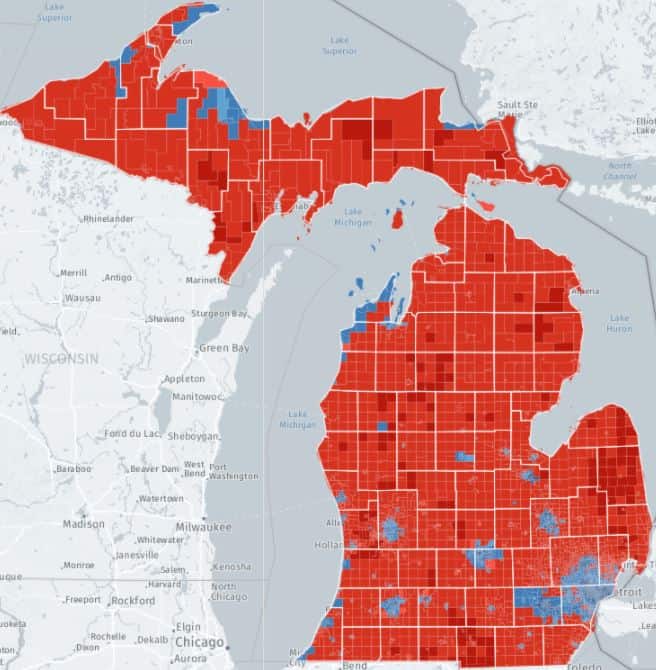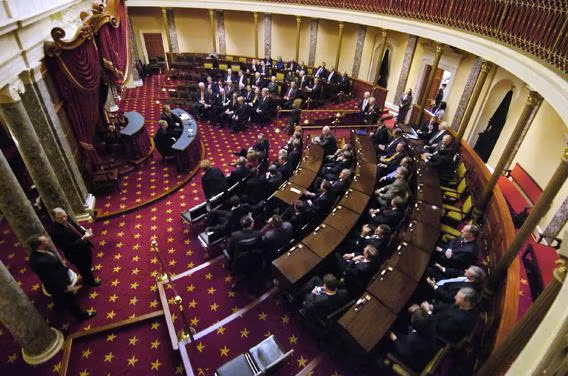LANSING – A bipartisan group of four representatives
representing both peninsulas said Thursday they are introducing bills designed
to remove barriers for businesses and individuals in the state to generate
their own energy and receive fair-value pricing.
Jeff Irwin(D-Ann Arbor) andRep.
Ed McBroom(R-Vulcan) worked on similar legislation last term and
joinedRep.
Scott Dianda(D-Calumet) andRep.
Gary Glenn(R-Midland) to introduce bills again this term.
The legislation will officially be introduced next week,
but two of the bills would set up a framework to allow members to buy shares of
a renewable energy system and receive a monthly bill credit for their shares’
output and modify net metering rules to remove the cap on participants.
The other two bills would create a framework for pricing
the power generated by consumers and put back on the grid using a market-based
approach is used to ensure both the customer and the utility are fairly
compensated and addressing concerns that the cost of integrating distributed
generation would otherwise be subsidized by other customers.
McBroom, sponsor of the net metering bill, said he would
like to see much more freedom for residents to participate in the program.
“As a farmer, I have been interested in seeing my
fellow farmers generate their own energy,” he said. “Because of
current caps and restrictions and really in my opinion not finding a fair
compensation for the energy they are generating, we are not allowing (that
freedom).”
Glenn, whose bill would allow groups to buy shares of
renewable energy, which he calls a community renewable energy garden, said it
would provide more choice for ratepayers, including schools.
“Everyone should have the opportunity to invest in
renewable energy, even if they can’t install a system at their own home or
business,” he said. “The community energy bill would enable a wide
range of people to share the up-front costs and long-term benefits of producing
renewable energy, keeping more of our energy dollars here in Michigan. It’s
pro-jobs, pro-environment, and pro-freedom.”
Irwin said the pricing bill would takes into account what
kind of energy at what time, the value that is produced by energy at the tips
of the network and credits for distribution.
“As Michigan’s highly-successful renewable energy
standard expires this year, the Energy Freedom legislation is a bipartisan,
bipeninsular effort to continue shaping our state’s energy future for the
better,” he said. “We should be encouraging people to produce clean
energy right here in Michigan, not encumbering them with bureaucratic rules.
The Energy Freedom bills would remove barriers to renewable energy production
for homeowners, business owners and nonprofits across the state.”
Dianda added the bills would help with the unique energy
situation in the Upper Peninsula.
“In the western U.P., distributed generation makes
sense because in some parts of the region we have very few homes and businesses
per mile of transmission line,” he said. “We should be encouraging
businesses and residents who want to generate their own energy from any of the
UP’s abundant resources, including geothermal heat from the mines, woody
biomass or solar energy. Such policies will help strengthen our energy
infrastructure and provide much needed jobs.”
But a coalition representing large utilities and other
interests criticized the bills as risky. Utilities such as DTE Energy and
Consumers Energy have said those using the net metering program need to pay for
keeping up the power grid.
“Any new energy policy in Michigan must address the
issue of fairness and make sure that everyone pays their fair share to support
our energy grid,” said Kelly Rossman-McKinney, spokeswoman for Citizens
for Michigan’s Energy Future. “It appears that Rep.
Gary Glenn‘s proposal will actually perpetuate policies that are unfair to
Michigan customers. We all rely on the grid every day for energy and no one
deserves a special deal or unfair subsidies. Everyone should be treated equally
and fairly.”
This story was published by Gongwer News Service. To
subscribe, click on www.gongwer.com






